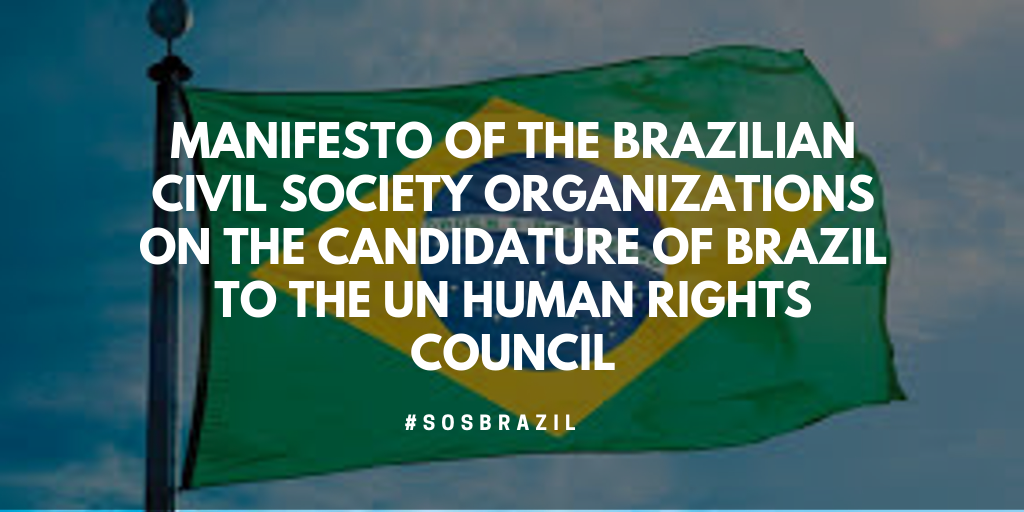Manifesto of the Brazilian civil society organizations on the candidature of Brazil to the UN Human Rights Council
The Brazilian civil society organizations, supported by several foreign, regional and international organizations, express their deep and grave concern about the Brazilian candidacy for the United Nations Human Rights Council […]

The Brazilian civil society organizations, supported by several foreign, regional and international organizations, express their deep and grave concern about the Brazilian candidacy for the United Nations Human Rights Council (HRC) for the three-year period 2020- 2022. These concerns have already been expressed several times by civil society and are reiterated in view of the position adopted by the Brazilian government in the United Nations spaces, including and particularly reiterated by the president himself in his speech at the opening of the 74th UN General Assembly.
The stances taken by the Brazilian government justifying its candidacy contradict the Brazilian tradition accrued along decades ago in multilateral relations that always defended the universalism of human rights.
These stances do not recognize human rights as a system of protection for everyone because they are guided by the defense of the “good humans”, “the right humans” the only entitled to enjoy human rights, while other beings humans, the “criminals” and those who support them are not regarded as rights holders. Positions of this type promote exclusion and attack against women, LGBTIs, indigenous peoples, quilombolas, traditional peoples and communities, black communities, young people, among others. These repeated stances, which are also becoming practices of the Brazilian government, are not acceptable. A government that acts with serious reservations to human rights, and that promotes actions that lead to setbacks in the realization of rights, is anti-universalistic and cannot expect the international community to believe that Brazil is committed to a view that human rights are progressively realized, universal, interdependent and indivisible, for all individuals.
The signatory organizations reject the actions resulting from these stances by the Brazilian government, such as the glorification of atrocities, including through attacks against the United Nations High Commissioner for Human Rights; the dismantling of the National Mechanism for the Prevention of Torture, in violation of the Optional Protocol to the United Nations Convention against Torture; the dismantling of social participation councils; the order by the President of the Republic to the military to commemorate the coup d’etat of 1964 and the official denial of the same coup; the categorical refusal to continue the process of demarcation of indigenous territories; disrespect and attack against traditional peoples and communities; the rejection of the recognition of the gender issue by explanation of vote during the 41st Regular Session of the Human Rights Council; reprisal against human rights defender Jean Wyllys during the 40th ordinary session of the Human Rights Council; the setbacks in the fight against slave labor; incitement to violence against traditional peoples and communities, their lands and territories; legislation of gun ownership laws for landowners and statements legitimizing violence against these populations, including landless people, among other measures.
Such stances and actions are incompatible with the objectives of the Human Rights Council, whose work must be guided by universality, impartiality, objectivity and non-selectivity, a constructive international dialogue and cooperation to improve the promotion and protection of all rights, in accordance with the Article 4 of Resolution 60/251 of the General Assembly of the United Nations. The same Resolution, in its article 9, establishes that the members of the Human Rights Council must uphold the highest level of protection and promotion of Human Rights. This means that, to qualify for a position in the Human Rights Council, a candidate state must set the example and make the best efforts to promote and protect human rights.
The signatory organizations affirm that the Brazilian State does not meet the minimum conditions to apply for the renewal of its candidacy for the Human Rights Council, in view of the conditions of the said resolution. Therefore, they do not recommend the international community of States to vote for Brazil for one of GRULAC’s vacancies for the three-year period 2020-2022.
In addition, civil society organizations expect the international community of states to more closely monitor the human rights situation in Brazil.

